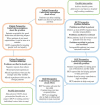'We are the advocates for the babies' - understanding interactions between patients and health care providers during the prevention of mother-to-child transmission of HIV in South Africa: a qualitative study
- PMID: 31290377
- PMCID: PMC6713950
- DOI: 10.1080/16549716.2019.1630100
'We are the advocates for the babies' - understanding interactions between patients and health care providers during the prevention of mother-to-child transmission of HIV in South Africa: a qualitative study
Abstract
Background: HIV/AIDS has had a significant impact on maternal and child health in South Africa. It is thus of vital importance to implement interventions to prevent mother-to-child transmission of HIV (PMTCT) as early as possible during pregnancy. Negative interactions between patients and health care providers (HCPs) can be an important barrier to antenatal care, PMTCT use and PMTCT adherence. Research about respectful maternity care has focused more on the patient perspective. We therefore compared the patient and HCP perspectives and reflected on how interactions between HCPs and patients can be improved. Objective: To obtain insights into the attitudes of HCPs in the context of HIV and PMTCT-related care, by studying patient and HCP perceptions of their interactions, in a peri-urban hospital setting in Gauteng province, South Africa. Methods: A qualitative study was conducted in a public tertiary-level hospital. Fourteen semi-structured in-depth interviews were conducted with nurses and doctors in the antenatal clinic and postnatal ward. Thirty-one semi-structured in-depth interviews and two focus group discussions were conducted with HIV positive and negative women on the postnatal ward. Results: HCPs experienced a difficult work environment due to a high workload. This was combined with frustrations when they felt that patients did not take responsibility for their own or their child's health. They were motivated by the need to help the child. Patients experienced judging comments by HCPs especially towards younger, older and foreign women. They expressed fear to ask questions and self-blame, which in some cases delayed health care seeking. No discrimination or isolation of HIV infected patients was reported by patients and HCPs. Conclusion: We hypothesize that more humane working conditions for obstetric HCPs and a caring, personalised approach to patient management can improve patient-provider interactions and access to respectful care. These are critical to preventing mother-to-child transmission of HIV.
Keywords: HIV; Respectful maternity care; access to health care; individualised care; interpersonal interactions; patient-centred care; personalised health care; prevention; quality of care.
Figures
Similar articles
-
Integrating the prevention of mother-to-child transmission of HIV into primary healthcare services after AIDS denialism in South Africa: perspectives of experts and health care workers - a qualitative study.BMC Health Serv Res. 2020 Jun 26;20(1):582. doi: 10.1186/s12913-020-05381-5. BMC Health Serv Res. 2020. PMID: 32586318 Free PMC article.
-
A cluster randomized controlled trial of lay health worker support for prevention of mother to child transmission of HIV (PMTCT) in South Africa.AIDS Res Ther. 2017 Dec 16;14(1):61. doi: 10.1186/s12981-017-0187-2. AIDS Res Ther. 2017. PMID: 29248014 Free PMC article. Clinical Trial.
-
Option B+ Program for the Prevention of Vertical Transmission of HIV: A Case Study in Johannesburg, South Africa.Front Public Health. 2020 Oct 28;8:533534. doi: 10.3389/fpubh.2020.533534. eCollection 2020. Front Public Health. 2020. PMID: 33194942 Free PMC article.
-
Male involvement and prevention of mother-to-child transmission of HIV in Sub-Saharan Africa: an integrative review.Curr HIV Res. 2013 Mar;11(2):169-77. doi: 10.2174/1570162x11311020009. Curr HIV Res. 2013. PMID: 23432492 Review.
-
Intrapartum management for prevention of mother-to-child transmission of HIV in resource-limited settings: a review of the literature.Afr J Reprod Health. 2013 Dec;17(4 Spec No):107-17. Afr J Reprod Health. 2013. PMID: 24689322 Review.
Cited by
-
Women's Experiences of the Effect of Financial Strain on Parenting and Mental Health.J Obstet Gynecol Neonatal Nurs. 2020 Nov;49(6):581-592. doi: 10.1016/j.jogn.2020.07.002. Epub 2020 Aug 19. J Obstet Gynecol Neonatal Nurs. 2020. PMID: 32822649 Free PMC article.
-
Testing for saturation in qualitative evidence syntheses: An update of HIV adherence in Africa.PLoS One. 2021 Oct 19;16(10):e0258352. doi: 10.1371/journal.pone.0258352. eCollection 2021. PLoS One. 2021. PMID: 34665831 Free PMC article.
-
Translating new evidence into clinical practice: a quasi-experimental controlled before-after study evaluating the effect of a novel outreach mentoring approach on knowledge, attitudes and confidence of health workers providing HIV and infant feeding counselling in South Africa.BMJ Open. 2020 Oct 27;10(10):e034770. doi: 10.1136/bmjopen-2019-034770. BMJ Open. 2020. PMID: 33109638 Free PMC article.
References
-
- National Committee on Confidential Enquiries into Maternal Deaths Saving mothers 2008–2010: fifth report on the confidential enquiries into maternal deaths in South Africa. Pretoria: Department of Health Republic of South Africa; 2012.
-
- Statistics South Africa Millennium development goals: reduce child mortality 2015. Pretoria: Republic of South Africa; 2015.
-
- The National Maternity Guidelines Committee Guidelines for maternity care in South Africa: a manual for clinics, community health centres and district hospitals. Pretoria: Department of Health Republic of South Africa; 2015.
-
- National Department of Health South Africa National consolidated guidelines for the prevention of mother-to-child transmission of HIV (PMTCT) and the managment of HIV in children, adolescents and adults. Pretoria: Department of Health Republic of South Africa; 2015.
Publication types
MeSH terms
LinkOut - more resources
Full Text Sources
Medical
Research Materials
Miscellaneous

